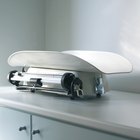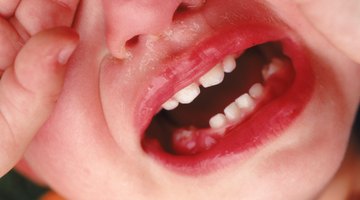Erections in Babies
New babies are full of surprises, and for many parents of newborn boys, infant erections are one of the biggest surprises of all. If you notice a baby's erection during his bath or when changing his diaper, it's normal to feel a little concerned. But in most cases, your baby's erections are not a cause for worry.
Identification
Erections are common in children during their infant and toddler years, according to KidsHealth.org, an online parenting and health information resource maintained by the Nemours Foundation. In addition to being erect, you may notice that your child's penis seems abnormally large during his newborn days. Maternal birth hormones and the trauma of birth cause this additional girth; it usually subsides within a few days.
Causes

Rapid Breathing in Newborns
Learn More
Many times, erections in newborn babies occur for no reason at all. Like startling or gripping, erections may manifest as early signs that your son's nervous system is functioning properly, explains the Children's Physician Network. Additionally, a newborn's erections can be a sign that his bladder is full and he needs to urinate.
Considerations
Infant erections are part of a baby's natural process of exploring and familiarizing himself with his body, explains KidsHealth.org. Though a baby's erection may make you feel a little uncomfortable, handling it in a calm, matter-of-fact way that doesn't make your child feel dirty or ashamed is important, since your behavior will be his earliest lesson in sexuality.
Warning

The Ideal Weight Gain for a 3-Week-Old
Learn More
If your son seems to have a persistent erection that lasts for more than a few hours or if you notice other worrying symptoms, such as a rash, fever or skin discoloration, call your pediatrician. She can evaluate your son's erection and let you know whether it's normal.
Expert Insight
Don't worry if your baby boy seems to enjoy touching or rubbing his penis, giving himself an erection, as this is perfectly normal infant behavior, notes Anita Sethi, research scientist at the Child and Family Policy Center at New York University, in "Parenting" magazine. Your baby will eventually outgrow the habit on his own.











